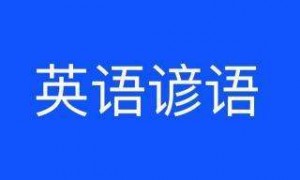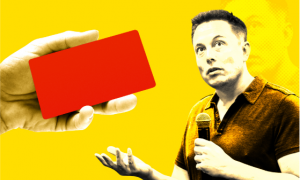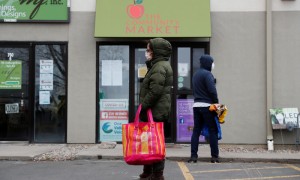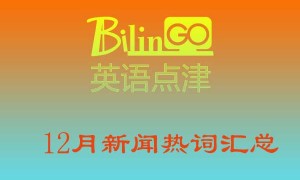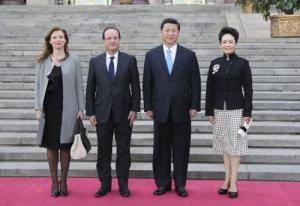
French President Francois Hollande starts a two-day visit to China on Thursday, hoping that the trappings of a state visit to the world's second strongest economic power will curb the growing criticism of his government at home.
Hollande's visit is the first by a leader of a major Western power since the new Chinese leadership led by President Xi Jinping assumed office. It is also the first visit since the Cypriot banking bailout, and Chinese leaders will seek reassurances from Hollande that the European union finally has the eurozone crisis under control.
Interestingly, the French central bank is reportedly ready to explore the possibility of using the renminbi in bilateral trade deals. this could be a ploy to increase the chances of Paris playing a role as an offshore center for the Chinese currency. It will face tough competition, however, from London and Hong Kong.
Given the economic problems facing France, Hollande will seek to push French exports, including Airbus, and welcome inward investment from China. Apart from seeking to expand financial and commercial ties, Hollande and his Chinese interlocutors will also discuss the developments on the Korean Peninsula, as well as the Syrian and Iranian issues. Hollande is likely to push Xi to influence the erratic behaviour of the Democratic People's Republic of Korea. Besides, France believes that a nuclear DPRK is not in China's best interest.
Although Hollande and Xi will discuss bilateral and international issues, it will be no surprise if they have a private conversation on how to deal with corruption, which was identified by Xi as one of the biggest challenges facing China in his acceptance speech after being nominated president.
Hollande defeated former president Nicolas Sarkozy in last year's election partly on the promise that he would reject austerity and lead France back to economic growth and partly because he promised that his government, unlike that of his predecessor, would be scandal free.
Now Hollande is being forced to admit that there is no magic wand to reinvigorate the ailing French economy. He is facing difficult decisions on how to reduce public expenditure.
Worse, his government is being mired in its own corruption scandal.
In his first year in office, unemployment in France has risen to 3.2 million, the highest level in 15 years. Debt has climbed above 90 percent of GDP and the promise to reduce the deficit this year to 3 percent of output has been shelved. With little or no growth there is no alternative but to cut public spending. According to its own assessment, France needs to cut 60 billion euros ($78.27 billion) in spending by 2017.
Hollande's dramatic drop in opinion polls is partly because of his failure to bring about economic growth and partly because of ministerial scandals. Recently, one of his closest ministerial confidants, Jerome Cahuzac, admitted that he had hidden 600,000 euros in a Swiss bank account, after having repeatedly denied it. He was forced to resign and is now being investigated for tax fraud.
Now the president has decreed that ministers should reveal details of their personal wealth in an effort to regain public trust. Each of France's 37 ministers is required to publish details of their personal finances. The list of assets includes details of bank accounts, life assurance policies, property and other expensive items such as cars, art works and antiques.
In an effort to raise money, Hollande promised to tax the rich. But many have fled to neighbouring Belgium or, in the case of film star Gerard Depardieu, to Russia. These proposals are now in abeyance.
The question of corruption and transparency in government is part of the G20 agenda, and Russian President Vladimir Putin, too, has urged his ministers to reveal details of their private wealth.
Chinese leaders have made clear their concerns over the growing rich-poor gap and the dangers of untrammelled corruption. Social media are already playing their part in highlighting the expensive lifestyle of some officials. Perhaps China will also consider cracking down on tax evasion.
Neither French nor Chinese like paying taxes but public services must be financed from some source. How to deal with corruption and prevent tax evasion could well be the most interesting part of the Hollande-Xi talks.
The author is director of the EU-Asia Centre.
中文对照:
4月25日,法国总统弗朗索瓦•奥朗德开始了为期两天的访中之旅。中国是世界第二大经济体,奥朗德希望此次国事访问能减少法国国内对法国政府越来越多的批评声。
奥朗德是中国国家主席习近平上任后第一位访华的西方大国领导,同时这也是他在塞浦路斯银行救助案达成后的首次出访。中国领导人将从奥朗德处寻得确认:欧盟终于控制住了欧元区危机。
有趣的是,据报道,法国央行准备探索在双边贸易中使用人民币的可能性。这可能是巴黎为增加其成为人民币离岸中心可能性的一种策略。但是,伦敦、香港珠玉在前,巴黎将面临残酷的竞争。
鉴于法国目前面临的经济问题,奥朗德将大力推动法国出口,其中包括空中客车公司,并欢迎中国对法投资。除了力图扩大法中两国的金融和商务关系外,奥朗德和中国官员也将讨论朝鲜半岛问题以及叙利亚问题和伊朗问题。奥朗德有可能要求习近平对朝鲜的行为施加影响。此外,法国认为朝鲜开发核武器并不符合中国的最大利益。
奥朗德和习近平将讨论双边及国际问题,也可能就如何处置腐败进行私下谈话。习近平在获得主席提名后的演讲中指出腐败是中国面临的最大挑战之一。
在去年的总统大选中,奥朗德击败了前任总统萨科奇。一部分是因为他承诺将摈弃紧缩的经济政策,并带领法国实现经济增长。还有一部分是因为他承诺将不同于前任政府,将远离丑闻。
现在,奥朗德不得不承认,世界上没有复兴法国衰落经济的魔法棒。他正面临着如何减少公共开支的艰难决定。
更糟的是,他的政府正因腐败丑闻泥足深陷。
奥朗德上任第一年时,法国的失业人数上升至320万人,达15年来最高水平。举债超过了GDP的90%,而今年将赤字占GDP的比例降至3%的承诺也已搁置。因为几乎无法实现经济增长,政府除了削减政府开支外毫无他法。据法国估计,到2017年时,法国需要削减开支600亿欧元。
奥朗德在民意调查中支持率大幅下跌,一部分是因为他恢复经济的失败,一部分是因为内阁丑闻。近日,他最为亲近的内阁心腹之一,杰罗姆•卡于萨克在反复否认后终于承认在瑞士银行账户中私藏60万欧元。他被迫辞职,现正因骗税接受调查。
现在,奥朗德已颁布法令要求内阁部长公开个人财产的详细资料,试图重拾公共信任。37位部长,无一例外。资产列表包括银行账户、人寿保险单、房产及其他贵重物品(如车、工艺品、古董)的详细资料。
为了募集资金,奥朗德承诺向富人收税。但许多富人已逃去了邻国比利时,或者像电影明星杰拉尔•德帕迪约一样逃去了俄罗斯。这些提案现悬而未决。
反腐及扩大政府透明度已被G20会议提上议程,俄罗斯总统普京也敦促其内阁公开个人财产细节。
中国领导阶层已清楚表明其对贫富差距不断扩大的担忧,以及放纵腐败的危险。社交媒体已在曝光某些官员奢侈生活方式的问题上尽到了职责。也许中国还将考虑打击偷税漏税的行为。
法国人与中国人都不喜纳税,但是公共服务必须由此筹资。如何应对腐败及阻止偷税漏税可能是奥朗德与习近平对话中最引人关注的部分。
本文作者系亚洲欧盟中心负责人弗拉泽•卡梅伦。
英文原文发表在4月25日的《中国日报》。


